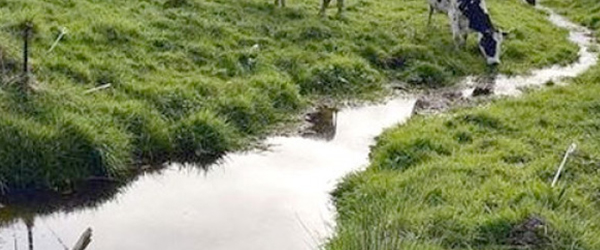
New Zealand’s dirty dairy – response to a farmer
February 15th, 2017In his opinion piece (“Who is the greater polluter, cows or people; NZ Herald, 27 January 2017”) Malcolm Lumsden tried to argue that people cause more damage than cows. Not only did the article use too much poetic licence, facts about the negative impact of animal farming on the environment were also hard to find.
Human farming of non-human animals causes extensive damage to our environment. The United Nations Food and Agriculture Organisation (FAO) have stated that the global ‘livestock industry’ is in the top three causes of all major environmental problems, including global climate change. Farming animals for food is responsible for at least 14.5% of greenhouse gas (GHG) emissions—more than all transport combined.
Dairy equals 27 million return flights from New Zealand
In New Zealand, total GHG emissions from dairy were estimated to be 19.2 Megatons CO2 equivalent in 2012, which is a whopping quarter of New Zealand’s total GHG emissions, or the equivalent of nearly 27 million return flights from Auckland to Samoa! These emissions are caused by cattle (and sheep) emitting gases (methane in particular), and through manure. Methane warms the atmosphere much more strongly than CO2. In addition, nitrous oxide emissions from manure and urine is almost 300 times stronger than CO2.
And we have not even begun to discuss dairy’s dirty ammonia gases, fertiliser use and pollution of groundwater, fresh water and soil, or the impact on biodiversity. Or the fact that nearly all dairy farms import a feed supplement, palm kernel expeller, which is derived from the palm seeds of oil palm. Palm oil plantations cause deforestation, biodiversity loss, and GHG emissions outside New Zealand. Thus, dairy contributes to environmental destruction in New Zealand and further afield.
Water wisdom
The average water ‘footprint’ at the end of a dairy cow’s life time is 20,558m3, which is considerable. The water footprint of milk is 1,020m3/ton, which is more than three times that of vegetables (322m3/ton), nearly three times that of starchy roots (387m3/ton) and nearly 6% more than fruit (962m3/ton). Because of the negative impact of animal agriculture on the environment, a range of scientists have suggested that “managing the demand for animal products by promoting a dietary shift away from a meat-rich diet will be an inevitable component in the environmental policy of governments.”
It’s a cow’s life
In addition to environmental issues, dairy farming causes substantial animal welfare problems. The investigations over the last two dairy calf seasons have caused controversy and led to prosecutions for animal cruelty, but it’s not the whole story. Due to extreme selective breeding, cows now produce more milk than ever before, with some producing 35 litres a day, which takes its toll on cows’ bodies. Milk yield is up to six times more than what would be needed to feed a calf, and the energy this takes has been compared to a person jogging a marathon every day, seven days a week. As a result, up to a third of cows experience lameness or mastitis, and many suffer from metabolic hunger and other health and welfare problems.
Cows’ natural lifespan could be more than 20 years. However, cows are considered ‘spent’ and are sent for slaughter after only five to seven years. Their short lives consist of several cycles of being forcibly impregnated, delivering a calf (who is taken away just days after birth so that the cow’s milk can be extracted for ten months per year for human consumption), and cows trying to eat enough to sustain the unnaturally high milk yield.
During their miserable lifetime, cows and calves suffer physically and mentally. Cattle are prey animals and they do not tend to show pain easily. Animal welfare experts, however, are clear about the welfare issues in dairy cows. For example, John Webster, Emeritus Professor of Animal Husbandry at the University of Bristol has stated that “most of the welfare problems (the ‘production diseases’) of the dairy cow arise from the fact she has to work so hard for so long.”

Future farming
Beef is the most environmentally damaging, and dairy cheese, milk and fish also have a negative impact, while balanced plant-based diets can require just one third of the fertile land, fresh water and energy of the typical Western ‘meat-and-dairy’ based diet.
It is therefore time to review our practices and develop more sustainable and animal-friendly farming methods. It makes sense to suggest a transition away from farming animals to growing crops, and investing in other agroforestry, tourism, renewable energy and other sustainable industries.
People don’t like to be told what (or what not) to eat or how to farm. Fair enough. However, more and more people now choose to replace animal products with plant-based alternatives. The government ought to help farmers protect their livelihoods. Not by propping up damaging dairy industries, but by showing political leadership. New Zealand could have an amazing future if the government provided incentives to farmers wishing to move away from livestock farming and transition into growing crops. This would also achieve improvements in public health, the environment, New Zealand’s reputation, and of course, reduce animal suffering. We cannot afford to lose any more time; the climate clock is ticking…
You can help minimise your environmental impact by following the tips in our free 100% vegetarian starter guide.
Jasmijn de Boo, SAFE CEO and animal welfare scientist.
 SAFE Animal Squad
SAFE Animal Squad